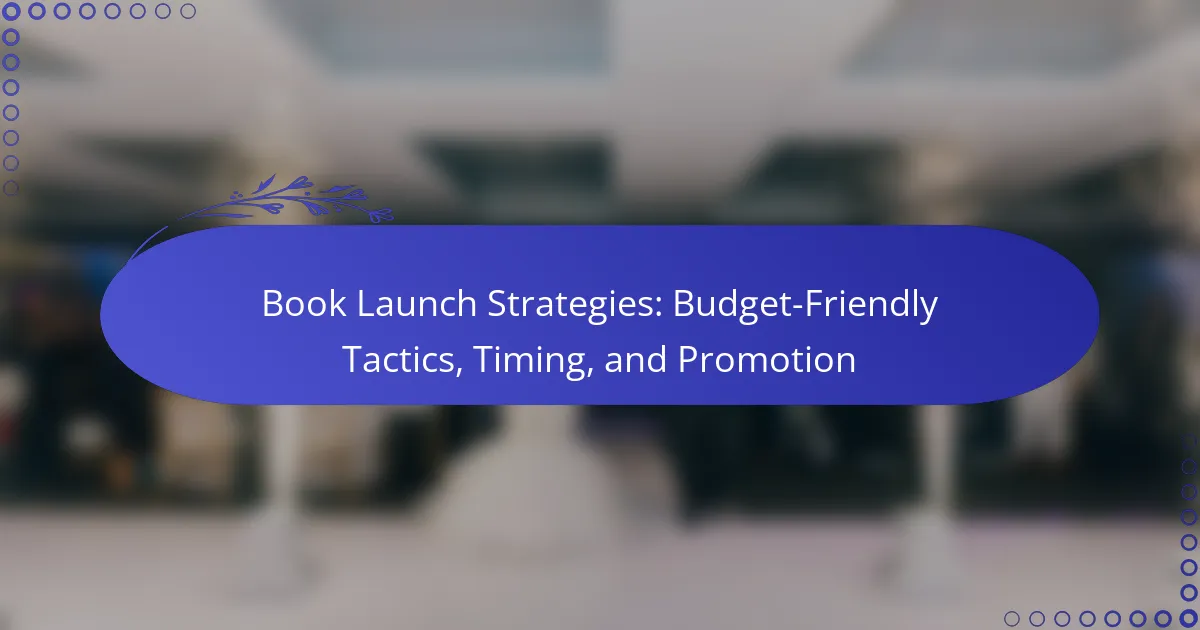Launching a book on a budget doesn’t mean sacrificing impact; effective strategies can enhance visibility and engagement without hefty expenses. By leveraging social media, local collaborations, and strategic timing, authors can create a memorable launch that resonates with their audience. Emphasizing creativity and resourcefulness allows for effective promotion while keeping costs low. For more insights, check out our author website creation.
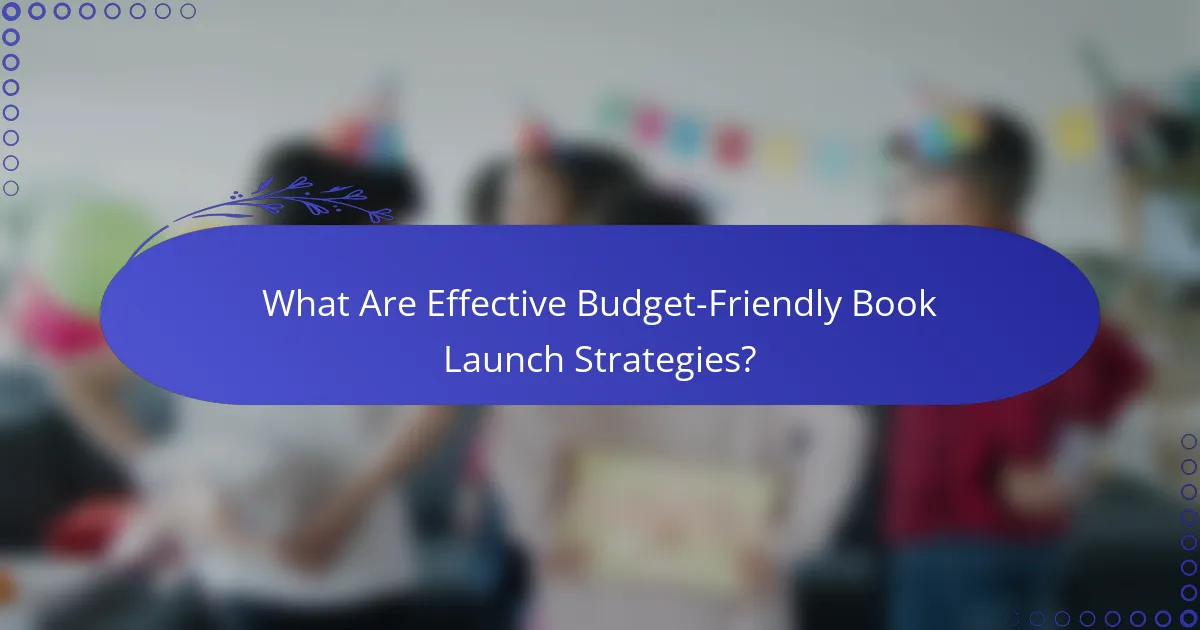
What Are Effective Budget-Friendly Book Launch Strategies?
Effective budget-friendly book launch strategies focus on maximizing visibility and engagement without incurring significant costs. Utilizing social media, collaborations, and local events can create a strong promotional impact while keeping expenses low.
Social media marketing
Social media marketing is a powerful tool for promoting your book launch at minimal cost. Platforms like Facebook, Instagram, and Twitter allow you to reach a broad audience through organic posts and targeted ads.
To maximize your impact, create engaging content that resonates with your target readers. Use visuals, such as cover reveals or quotes, and encourage followers to share your posts to increase reach.
Collaborative promotions
Collaborative promotions involve partnering with other authors or influencers to cross-promote each other’s work. This strategy can expand your audience without the need for a large budget.
Consider organizing joint giveaways or hosting virtual events together. This not only increases visibility but also builds a supportive community among authors and readers.
Utilizing email newsletters
Email newsletters are an effective way to engage with your existing audience and promote your book launch. Building a mailing list allows you to communicate directly with interested readers.
Send out regular updates about your book, including sneak peeks, launch dates, and exclusive content. Aim for a consistent schedule, such as bi-weekly or monthly, to keep your audience engaged.
Leveraging local events
Leveraging local events can help you connect with your community and promote your book without significant expenses. Look for local fairs, book clubs, or library events where you can showcase your work.
Participating in these events allows for direct interaction with potential readers. Consider offering a reading or a Q&A session to engage your audience and generate interest.
Creating a book trailer
Creating a book trailer is a creative way to generate buzz for your launch. A short, engaging video can capture the essence of your book and attract viewers on platforms like YouTube and social media.
Keep your trailer concise, ideally under two minutes, and focus on compelling visuals and a strong narrative hook. Use free or low-cost video editing tools to produce a professional-looking trailer without breaking the bank.

When Is the Best Time to Launch a Book?
The best time to launch a book depends on various factors, including seasonal trends, market research, and author availability. Timing your launch effectively can significantly impact visibility and sales potential.
Seasonal trends
Seasonal trends play a crucial role in determining the optimal launch time for a book. For instance, launching during the holiday season can boost sales due to increased consumer spending. Conversely, summer months may see lower sales as readers are often engaged in outdoor activities.
Consider aligning your launch with specific events or holidays relevant to your book’s theme. For example, a romance novel might perform well around Valentine’s Day, while a self-help book could see traction in January when many people set New Year’s resolutions.
Market research insights
Conducting market research is essential for identifying the best launch window. Analyze trends in your genre, including peak sales periods and reader preferences. Tools like Google Trends or social media analytics can provide insights into when potential readers are most engaged.
Additionally, consider your target audience’s demographics. For example, if your book appeals to students, launching in late summer or early fall may be advantageous as they prepare for a new academic year.
Author availability
Your availability as an author is a critical factor in choosing a launch date. Ensure you have sufficient time to promote your book effectively through events, social media, and outreach. A well-planned launch requires your active participation to engage with readers and the media.
Also, consider your personal schedule. Avoid launching during busy periods in your life, such as work commitments or family events, as this can hinder your promotional efforts and overall success.
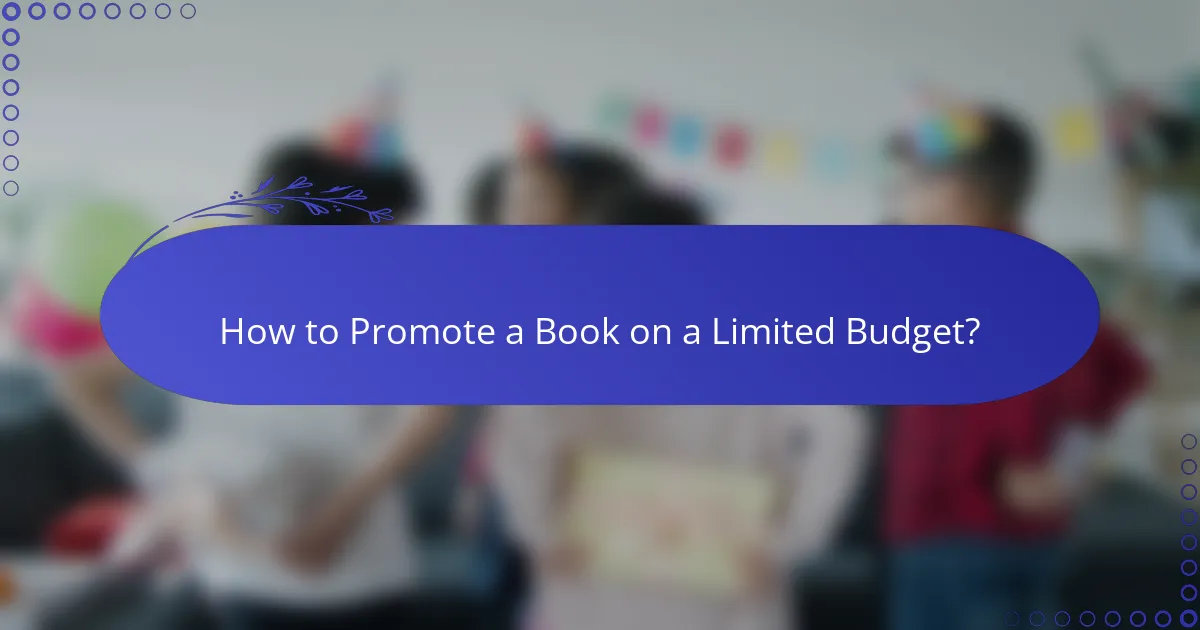
How to Promote a Book on a Limited Budget?
Promoting a book on a limited budget requires creativity and resourcefulness. Focus on leveraging free resources, engaging local communities, and forming partnerships to maximize your reach without significant financial investment.
Free online platforms
Utilizing free online platforms is a cost-effective way to promote your book. Social media sites like Facebook, Instagram, and Twitter allow you to create a presence and share updates with potential readers. Consider using platforms like Goodreads to connect with book lovers and gather reviews.
Blogs and forums related to your book’s genre can also be valuable. Engage with these communities by sharing insights, answering questions, and offering free excerpts to pique interest. This approach builds credibility and encourages word-of-mouth promotion.
Grassroots marketing
Grassroots marketing focuses on building relationships within your local community. Organize book readings or signings at local libraries, cafes, or bookstores, which often welcome local authors. These events can attract attention and create a loyal reader base.
Additionally, consider partnering with local organizations or schools for workshops or discussions related to your book’s themes. This not only promotes your book but also establishes you as an authority in your field.
Influencer partnerships
Forming partnerships with influencers can amplify your book’s visibility without breaking the bank. Look for micro-influencers in your genre who have engaged audiences and are open to collaborations. They often charge lower fees or may promote your book in exchange for a free copy.
When reaching out, personalize your message and explain how your book aligns with their content. A well-crafted pitch can lead to reviews, social media posts, or even interviews, significantly expanding your reach.
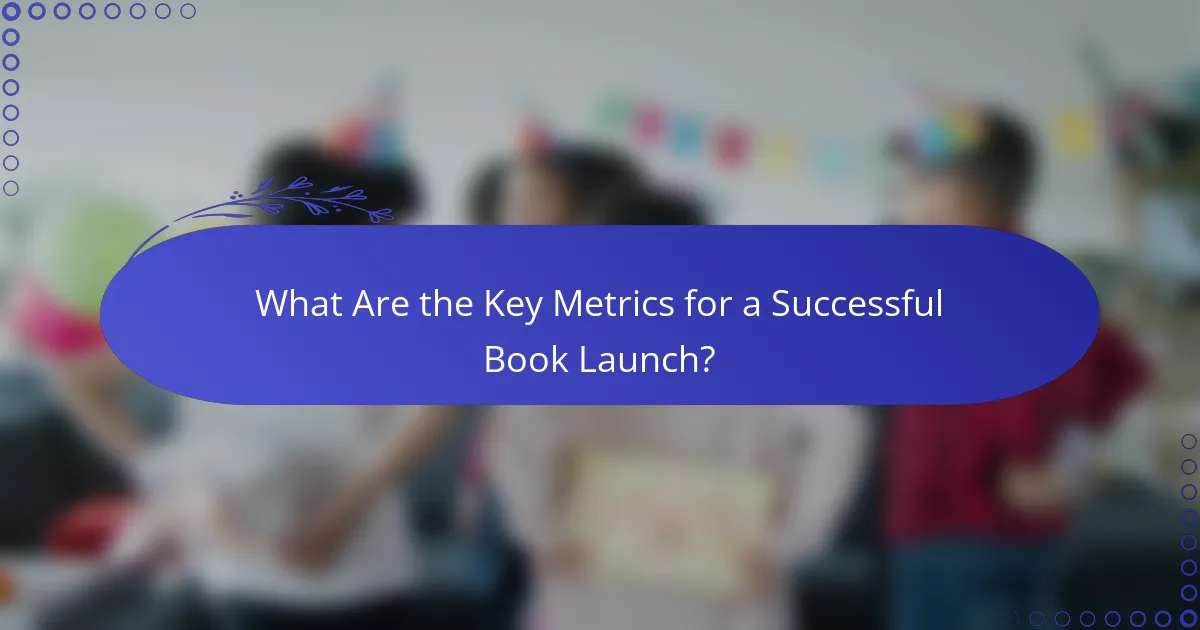
What Are the Key Metrics for a Successful Book Launch?
The key metrics for a successful book launch include sales figures, reader engagement, and social media reach. These indicators help authors and publishers assess the effectiveness of their launch strategies and identify areas for improvement.
Sales figures
Sales figures are the most direct measure of a book’s success at launch. Tracking the number of copies sold in the first few weeks can provide insights into market demand and the effectiveness of promotional efforts. Aim for a target that aligns with your goals, such as breaking into bestseller lists or achieving specific revenue milestones.
Consider comparing your sales figures to similar titles in your genre. This can help you gauge performance and set realistic expectations. For instance, a successful launch might see sales in the low thousands within the first month for a debut author.
Reader engagement
Reader engagement reflects how well your audience connects with your book. Metrics such as reviews, ratings, and reader feedback on platforms like Goodreads or Amazon can indicate how your book resonates with its audience. High engagement often correlates with word-of-mouth promotion, which is invaluable for sustained sales.
Encourage readers to leave reviews by offering incentives, such as exclusive content or giveaways. Aim for a target of at least 20-30 reviews within the first month to build credibility and visibility.
Social media reach
Social media reach measures how effectively you can promote your book across various platforms. Track metrics such as likes, shares, comments, and follower growth to assess your promotional impact. A strong social media presence can amplify your book’s visibility and foster a community around your work.
Consider creating a content calendar to plan your posts leading up to and following the launch. Engaging with your audience through polls, Q&A sessions, or live readings can boost interaction. Aim for a growth rate of 10-20% in followers during the launch period to maximize your reach.
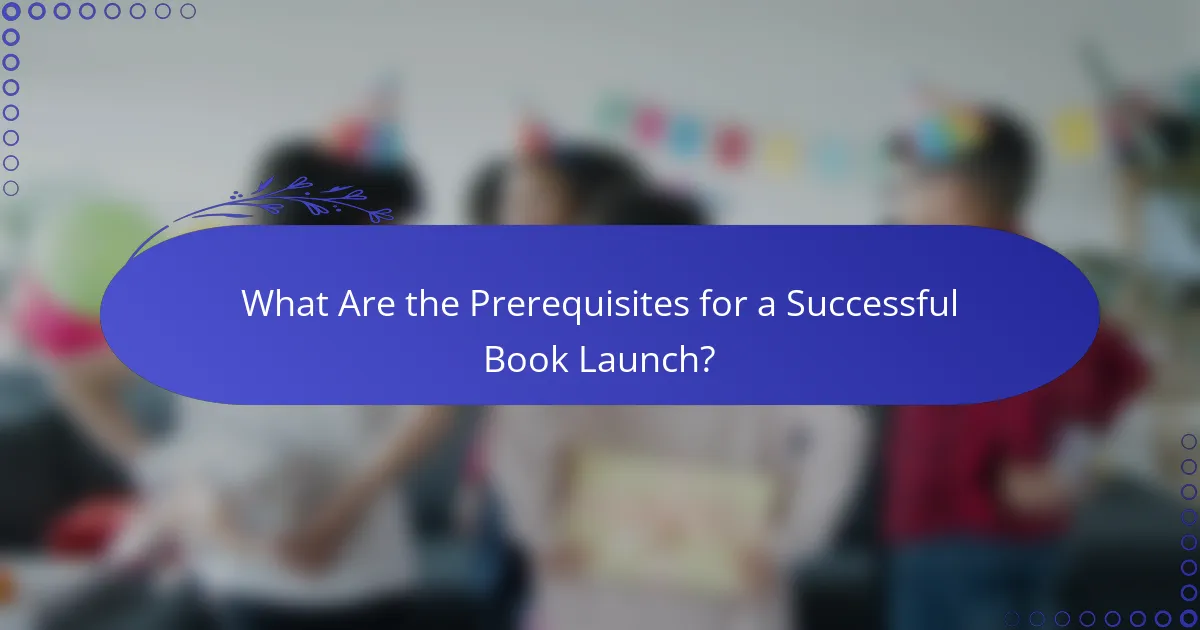
What Are the Prerequisites for a Successful Book Launch?
A successful book launch requires careful planning and execution of several key elements, including editing, cover design, and ISBN registration. These prerequisites set the foundation for effective promotion and reader engagement.
Editing and proofreading
Editing and proofreading are crucial steps in preparing your manuscript for publication. A well-edited book enhances readability and professionalism, making it more appealing to potential readers. Consider hiring a professional editor or utilizing beta readers to provide feedback.
When editing, focus on structural elements, clarity, and flow. Proofreading should catch grammar, punctuation, and spelling errors. Aim for multiple rounds of edits to ensure your book is polished before launch.
Cover design
Your book cover is often the first impression readers will have, so investing in a quality design is essential. A compelling cover should reflect the genre and tone of your book while being visually appealing. Consider hiring a graphic designer or using design tools that offer templates tailored to your genre.
Keep in mind that the cover should be optimized for both print and digital formats. Research trends in cover design within your genre to ensure your book stands out in a crowded market.
ISBN registration
Registering for an International Standard Book Number (ISBN) is a critical step for any published book. An ISBN uniquely identifies your book, making it easier for retailers and libraries to order and catalog it. In the United States, you can purchase an ISBN from Bowker, while other countries have their own issuing agencies.
Decide whether you need a single ISBN for one format or multiple for different formats (e.g., paperback, ebook). Keep in mind that some self-publishing platforms provide free ISBNs, but these may limit your control over the book’s rights and distribution.

How Can Authors Leverage Local Communities for Launch?
Authors can effectively leverage local communities for their book launch by engaging with local readers, bookstores, and organizations. Building relationships within these communities can enhance visibility and create a supportive network that promotes the book.
Book signings
Book signings are a direct way to connect with local readers and create buzz around a new release. Authors can collaborate with local bookstores or libraries to host these events, allowing fans to meet them and purchase signed copies.
When planning a book signing, consider the timing and location. Weekends or evenings often attract more attendees, while partnering with a popular venue can draw in foot traffic. Promote the event through social media, local newspapers, and community boards to maximize attendance.
Don’t forget to prepare for the event by bringing promotional materials, such as bookmarks or flyers, to distribute. Engaging with attendees during the signing can also lead to word-of-mouth promotion, which is invaluable for future sales.
